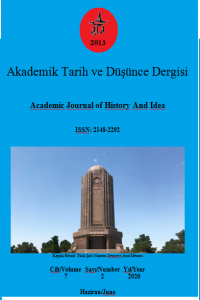Fransız Sömürgeciliğinin Temelleri: “Medenileştirme Misyonu” ve “Asimilasyon Doktrini”
Fransa Sömürgeciliği Fransa’nın milli karakterinden izler taşımaktadır. Fransa, Latin ırkına mensup olmak bakımından Roma’nın asimilasyon inancını 19. yüzyılın siyaset sahnesine taşımış ve bu anlayışı resmi bir doktrin seviyesine yükseltmiştir. Asimilasyon üstün toplumların alt seviyedeki toplumlara hükmetme ve talimat verme hakkına sahip olduğu anlayışına dayanır. Diğer bir ifadeyle fethedilenler fethedenlerin kurum ve geleneklerini benimsemek durumundadır. Aydınlanma döneminin entelektüel kazanımları ile yoğrulmuş Fransız İhtilali ile ortaya çıkan fikirler, Fransızlar tarafından tüm insanlığın ihtiyacı olan fikirler olarak ele alınmış ve bu üstün kültürel ve kurumsal kazanımların tüm insanlığa fayda sağlayacağı düşünülmüştür. İngiliz sömürgeciliği ile ilgili olarak “beyaz adamın yükü” anlayışında ifade edilen üstün toplumların daha alt seviyedeki toplumlara karşı sorumluluğu vardır anlayışı Fransızlar için “medenileştirme misyonu” adı altında vücut bulmuş gözükmektedir. Ancak İngilizlerin yerel unsurları kullanması, esnek ve ticari kar odaklı bakış açıları karşısında Fransızların katı ve merkeziyetçi asimilasyon fikri iki metodun farklarını ortaya koymaktadır. Asimilasyon tüm açmazlarına ve sömürge teorisyenleri tarafından eleştirilmesine rağmen resmi sömürge doktrini olma özelliğini sömürgelerin Frankofon toplumlarına dönüşeceği zamana kadar devam ettirmiştir.
Anahtar Kelimeler:
Fransız Sömürgeciliği, Medenileştirme Misyonu, Asimilasyon
Foundations of The French Colonialism: Civilizing Mission And Assimilation Doctrine
French Colonialism bears traces of the national character of France. France, in terms of belonging to the Latin race, brought the Roman's belief of assimilation to the political scene of the 19th century and raised this understanding to the level of an official doctrine. Assimilation is based on the understanding that superior societies have the right to dominate and instruct lower societies. In other words, the conquered have to adopt the institutions and traditions of the conquerors. The ideas that emerged the French Revolution, which were kneaded with the intellectual achievements of the Enlightenment period, were considered by the French as the ideas that all humanity needed, and it was thought that these superior cultural and institutional achievements would benefit all humanity. The understanding that superior societies have a responsibility to lower societies, which is expressed in the understanding of "white man's burden" regarding British colonialism, seems to be embodied under the name of "civilization mission" for the French. However, the use of local elements by the British and the flexible and commercial profit-oriented perspectives of the French, the strict and centralized assimilation idea of the French reveals the differences between the two methods. Despite all its deadlocks and criticism by colonial theorists, assimilation continued to be the official colonial doctrine until the colonies were transformed into Francophone societies.
Keywords:
French Colonialism, Civilizing Mission, Assimilation French Colonialism, Civilizing Mission, Assimilation,
___
- ANDREW, C. M. ve KANYA-FORSTNER, A. S.. “The French ‘Colonial Party’: Its Composition, Aims and Influence, 1885-1914”. The Historical Journal, c. 14, sayı 1, 1971, s. 99–128.
- BAUMGART, W., Imperialism: The Idea and Reality of British and French Colonial Expansion, 1880-1914, Oxford University Press, New York, 1982.
- BETTS, R. F., Assimilation and Association in French Colonial Theory, 1890-1914. New York and London: Columbia University Press, 1961.
- COHEN, W. B. “French Empire”, Colonialism: An International Social, Cultural, and Political Encyclopedia, C. 1, Abc-Clio, Oxford 2003, s. 214–218
- CONKLIN, A. L., A Mission to Civilize: The Republican Idea of Empire in France and West Africa, 1895–1930, , Stanford University Press, Standford 1997.
- DAUGHTON, J. P, An Empire Divided: Religion, Republicanism, and the Making of French Colonialism, 1880-1914, Oxford University Press, New York 2006.
- EVANS, Martin, “Culture and Empire, 1830–1962: An Overview”, Empire and Culture The French Experience, 1830–1940, (editör Martin Evans), Palgrave Macmillan, New York 2004.
- GENÇOĞLU M. - YOL F., “Başlangıçtan 19. Yüzyılın Sonuna Kadar Batı Sömürgeciliğinin Yapısı: Kavramlar Ve Yöntemler Üzerine Bir Araştırma”, International Social Mentality and Researcher Thinkers Journal, C. 8, sayı 55, 2022, s. 160–68.
- LEWIS, M. D. “One Hundred Million Frenchmen: The " Assimilation " Theory in French Colonial Policy”, Comparative Studies in Society and History, C. 4, sayı 2, 1962, s. 129–53.
- LAURENS, H., Les origines de l’expédition d’Égypte. Éditons du Seuil, Paris 1997
- OROSZ, Kenneth J., “French Empire”. Encyclopedia of the Age of Imperialism, 1800–1914, (editör Carl Cavanagh Hodge), C. 1 & 2, Greenwood Press, London 2015., s. 240–50.
- ROBERTS, S. H., History Of French Colonial Policy 1870-1925. C. 1,: P. S. King & Son, Ltd., London 1929.
- ROUX, F.-C., Bonaparte, Governor of Egypt. Methuen & Co Ltd, London 1937.
- SILVERA, A., “Egypt and the French Revolution, 1798-1801”, Revue française d’histoire d’outre-mer, C. 69, sayı 257, Persee 1982, s. 307–322.
- STRATHERN, P., Napolyon in Egypt, Random House Publishing Group, London 2008.
- Yayın Aralığı: Yılda 6 Sayı
- Başlangıç: 2013
- Yayıncı: Hakan YILMAZ
Sayıdaki Diğer Makaleler
Demirci Akıncıları Komutanlarından Kula’lı İhsanoğlu Mehmet Efe
Azərbaycan Nağıl Məkanının Təşkilində Toponimlər
زمینههای خاطره در رمان آتش به اختیار
Mahmood HADDADIAN, Habibullah ABBASİ
Yusuf Akçura’nın Vefatının Türk Basınına Yansımaları
Revan Muhafızı İbrahim Paşa’nın Muhallefatı
Azerbaycan-Dağıstan-Türkiye ilişkileri açısından Kumuk Hasay Han Usmiyev’in Faaliyeti
Rize’de Yaşanan Aşayiş Sorunuyla İlgili Birer İhbarname ve Layiha Örneği (1909-1911)
II. Dünya Savaşı'nda Türkiye'nin Savaş Dışı Kalma Çabalarında Türk Basını
Səfəvilər Dövlətində Kənd Təsərrüfatı, Sənətkarlıq və Ticarət (Rocer Seyvorinin Tədqiqatı Əsasında)
Fransız Sömürgeciliğinin Temelleri: “Medenileştirme Misyonu” ve “Asimilasyon Doktrini”
